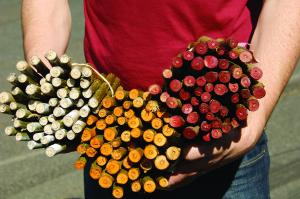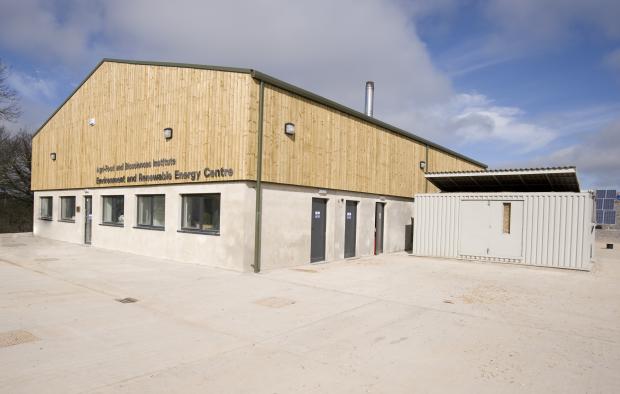Biomass crops
Research since the mid 1970s has included evaluation of willow clones, Short Rotation Coppice (SRC) crop management and associated activities, rust disease, agronomy of Miscanthus, forest brash for heating, drying systems, work on carbon footprint, bioremediation and biofiltration. Recent research includes Agricultural Need for Sustainable Willow Effluent Recycling (ANSWER project) in 2015.
Biomass crops

- Evaluation of willow clones best suited to Northern Ireland conditions
- SRC crop management, agronomy, harvesting and storage regimes
- Research into rust diseases and planting strategies to minimise rust damage
- Improving the agronomy of Miscanthus to achieve higher yields
- The utilisation of forest brash for biomass heating systems
- Drying systems for SRC willows
- The effect of the incorporation of renewable energy schemes on the carbon footprint of the AFBI Hillsborough site
- The use of SRC willows for bioremediation of wastes where research platforms include willows irrigated with: municipal primary effluent, farm yard wastewater, landfill leachate, agri-food waste waters (fruit, veg, dairy waste waters), willows being tested as a buffer strip to prevent run-off
The above research platforms are used to investigate:
- The effect of effluents on yield, willow plant and genotype specificity / suitability, soil, soil water and ground water
- The factors influencing the growth of willow irrigated with landfill leachate
- The impact of irrigation of bio-diversity
- The control of over-land flow of effluent following irrigation and Treatment system LCA
The Environment and Renewable Energy Centre

The EREC’s promotional activities highlight and demonstrate the benefits of land-based bio-renewables, environmental and low carbon activities and measures to mitigate climate change. Publications have been produced through this facility including conference, journal, popular articles and in-house and external seminars. The EREC hosts large numbers of visits (70/year) and seminars from farmer groups, student groups (Post Docs, MSc, Undergrad, A-Level and GCSE), researchers, Government departments, civil servants and agencies, SMEs from the energy, environment and water treatment sector and many more.
Bioremediation / biofiltration (short rotation coppice willow for waste water recycling)
Northern Ireland must play its part in meeting EU directives targeted at reducing greenhouse gas emissions, decarbonising energy supply and improving water quality. Technologies, methodologies and system strategies (researched and demonstrated at the Environment and Renewable Energy Centre at Hillsborough and linked with the renewable energy crops programme at Loughgall) can facilitate the uptake and implementation of these solutions within N.Ireland. In particular, the agri-food sector can sustainably manage increasing quantities of waste water effluents compliantly and cost effectively while addressing growing customer preference for low carbon production and environmental responsibility while contributing to indigenous biomass energy supply chains for low carbon energy generation.
Research experience
Research has been supported by the Northern Ireland government and EU funds to date, including:
- Interreg VB - NWE - Biowill Project
- ANSWER (Interreg IVA) – LEAD PARTNER - Agricultural Need for Sustainable Willow Effluent Recycling. Cross-border £2.1m project
- EU 6th Framework, BIOPROS, 9 Countries
- EU Life, Water RENEW Project, UK
- EU 5th Framework, Fair 5 (CT97-3947), (Sweden, France, Northern Ireland and Greece)
- RENEW Interreg IIIA – Lead Partner
Best Practice Guidelines
(1) Short rotation coppice willow best practice guidelines.
(2) Miscanthus best practice guidelines
(4) SRC Willow in the Landscape
(5) Agricultural Need for Sustainable Willow Effluent Recycling (ANSWER) -
- (a) Current knowledge
- (b) Project report
Publications
Johnston, C., Walsh, L.R.E., McCracken, A. (2021). Effect of two vs. three-year harvest intervals on yields of Short Rotation Coppice (SRC) willow. Biomass and Bioenergy, Volume 156, January 2022, 106303
McCracken, A.R., Johnston, C. (2015). Potential for wastewater management using energy crops. Management, Economic Engineering in Agriculture and Rural Development, 15(1):275-284
Olave, R., Forbes, E.G.A., Laidlaw, S., Easson, L., Munoz, F., Watson, S. (2015). Effects of plastic mulch on establishment, biomass production and nutrient content of Miscanthus x giganteus grown from a range of rhizome sizes and densities under cool temperate conditions. European Journal of Agronomy,
Forbes, E.G.A., Easson, D.L., L., Lyons, G.A., McRoberts, W.C. (2014). Physico-Chemical Characteristics Of Eight Different Biomass Fuels And Comparison Of Combustion And Emission Results In A Small Scale Multi-Fuel Boiler. Energy Conversion and Management, 87:1162-1169
Johnston, C., McCracken, A.R., Walsh L.E. Biomass production – exploiting short rotation coppice willow plantation multifunctionality to achieve the joint goals of biomass production and waste water management. Aspects of Applied Biology 131, 2015. Biomass and Energy Crops V